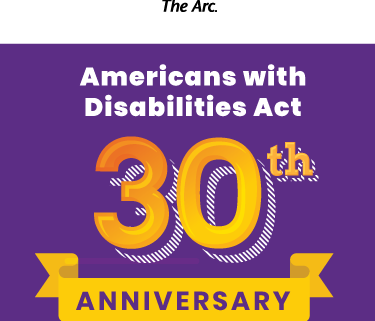ADA 30: Carrying on the Legacy
“I think we made great strides when it came to all the advocacy that went into the ADA. I do think if we didn’t do all of the advocacy for the ADA, we might not be where we are today in regards to people with disabilities.” – Joseph Damiano, Self-Advocate.
Joseph Damiano of Belfast, New York has never known life without the Americans with Disabilities Act, the ADA.
“The ADA was in place when I was born, so the ADA has been my viewpoint with everything that has gone on in my life,” Damiano said.
Damiano, 25, is a determined self-advocate who graduated from Alfred State College in June.
“I myself was able to go to college and you never heard about a lot people with disabilities going to college prior the ADA,” said Damiano.
As we mark 30 years since President George H.W. Bush signed the Americans with Disabilities Act into law, we reflect on the momentous fight for rights for people with disabilities, like Joseph Damiano and millions more. We give thanks to advocates everywhere who never gave up. We consider how the ADA can be improved and we envision what we want the future of the law’s promise to be, as advocates continue to demand better.
“We need to get more allies who know about the ADA and people to teach them it has lots of improvements still to be made such as accessible restrooms not always being accessible,” said Katie Griffith, a 34-year-old self-advocate from Gilbert, Arizona, who served as Ms. Wheelchair Arizona in 2016. “We need more advocates to unite.”
The Arc was instrumental in the fight for the ADA. The Arc’s Senior Policy Advisor Marty Ford served as one of many champions of the legislation. While Justin Dart, Jr. was the recognized leader of the substantial coalition effort to pass the law, Ford noted that former leaders of The Arc Elizabeth Boggs and Paul Marchand were integral in its passage. In addition, the grassroots actions from chapters and members of The Arc and other coalition organizations were critical to passage.
“One thing that is really important about the advocacy around the ADA is that everyone joined together. All of the advocacy organizations were in it together. One for all and all for one – no special deals,” said Ford reflecting back on the unified front to advance the rights of people with disabilities. “We didn’t allow ourselves to be pulled apart.”
Ford, whose brother Jud had intellectual disability, credits the ADA with laying critical groundwork.
“Through the success of ADA advocacy, the disability community became much more visible. Congress was much more aware of our issues and had more respect for the needs and the rights of people with disabilities. They started listening,” said Ford. “My brother lived most of his life before the ADA passed. I’m thrilled to see young self-advocates take leadership and take advantage of the ADA’s opportunities.”
“I look up to and have high respect for all the people who worked so hard to put the ADA in effect, as well as other disability laws,” said Griffith.
But thirty years later, our work is not done.
“It seems like they refuse to understand the ADA,” said Anthony Nash, a self-advocate from Richland, Washington, who was a little boy when the law passed. Nash says he regularly encounters businesses that are not in compliance with ADA regulations.
“We are fighting for respect and the right to live our lives,” said Nash, who is chairman of the Washington State Developmental Disabilities Council Public Policy Committee, “The ADA needs to be improved by being enforced in all businesses and schools. Respect what we want and not what they want. They are supposed to be supporting us in what we want in our lives.”
Nash is also a board member of The Arc of Washington State and Disability Rights Washington. He is also the web coordinator of Self-Advocates in Leadership.
As the ADA turns 30, Joseph Damiano is preparing for a new chapter of his life. He’s making plans to start in an employment training program while continuing his advocacy as chairman of self-advocacy group the Collaborative of New York.
“We shouldn’t stop advocating for the ADA right now even though the ADA is passed. We still need to fight for that and make sure the ADA stays in place,” said Damiano.
A strong advocate for independent living and home and community-based supports, Griffith has a message for other young people with disabilities who are carrying on the legacy.
“Is this the world we want to live in after your parents are gone? Is this the land of the free? Don’t ever be afraid to listen to that inner voice inside of you that tells you it’s okay to be the light and fight for your rights and the next generation and those with disabilities.”
Griffith, Damiano, and Nash are officers of The Arc’s National Council of Self Advocates












